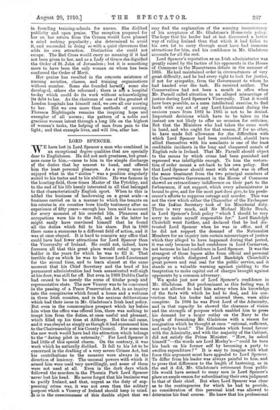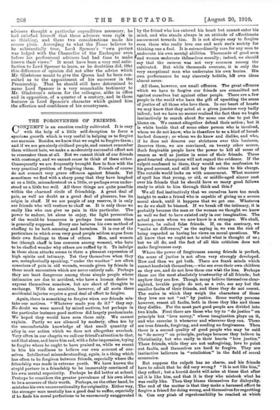LORD SPENCER.
WE have lost in Lord Spencer a man who combined in an exceptional degree qualities that are specially dear to Englishmen. He did not seek greatness, but great- ness came to him,—came to him in the simple discharge of the duties that lay nearest to hand, and offered him the least personal pleasure. As a young man he enjoyed what in the " sixties " was a position singularly suited to his tastes and to his abilities. He was famous in the hunting-field, three times Master of the Pytchley, and to the end of his life keenly interested in all that belonged to that Characteristically English sport. When to this is • added the business of landowning on a great scale—a • business carried on in a manner to which the tenants on -his estates in six counties bore kindly testimony after an experience of fifty years—enough has been said to account for every moment of his crowded life. Pleasures and occupations were his to the full, and in the latter he might easily have convinced himself that he found all the duties which fell to his • share. But in 1868 there came a summons to a different field of action, and it .was at once obeyed. It is hard to conceive any office that could have had fewer attractions for Lord Spencer than the Viceroyalty of Ireland. He could not, indeed, have foreseen all that this great place would. entail upon its 'holder in the years for which he was to fill it. That 'terrible day on which he was to become Lord-Lieutenant -for the second time, and to 'learn almost at the same -moment that his Chief Secretary and the head of his permanent administration had been assassinated well-nigh at his door, was still far off. But even in 1868 Dublin Castle -had ceased to be merely the scene of titular pomp and representative state: The new Viceroy was to be concerned -in the passing of a Peace Preservation Act, in an inquiry -into the conspiracies which found a home and a welcome in three. Irish counties, and in the anxious deliberations which had their issue in Mr. Gladstone's Irish land policy. But even in the commonplace prospect which lay before .him when the office was offered him, there was nothing to tempt him from the duties, at once useful and pleasant, which filled up his time at Althorp. But the call came, and it was obeyed as simply as though it had summoned him to the Chairmanship of his County Council. For some men the new work would have had the attraction which belongs to the " daring pilot in extremity." For- Lord Spencer it had little of this special charm. On the contrary, it was work which he naturally disliked. It fell to his lot to be concerned in the drafting of a very severe Crimes Act, but his contributions to the measure wore always in the direction of leniency. The unusual powers with which it armed him were used very unwillingly, and some of them were not used at all. Even in the dark days which followed the murders in the Phoenix Park Lord Spencer 'never lost his head. He never forgot that-his business was -to paCify Ireland, and that, urgent as .the duty of sup- 'pressing crime was, it was not even then the solitary -purpose which a Viceroy of Ireland should keep in mind. It is in the 'consciousness of this double 'object that we may find the explanation of the seeming inconsistency of his acceptance of Mr. Gladstone's Home-rule policy. The hope that his leader had at last discovered a better way of ruling Ireland than that which it had fallen to his own lot to carry through must have had immense attractions for him, and his confidence in Mr. Gladstone accounts for all the rest.
Lord Spencer's reputation as an Irish administrator was greatly raised by the tactics of his opponents in the House of Commons in the Maamtrasna debate in the summer of 1885. He had maintained order in circumstances of very great difficulty, and he had every right to look for justice, if not for sympathy, from the Government to whom he had handed over the task. He received neither. The Conservatives had not been a month in office when Mr. Parnell called attention to an alleged miscarriage of justice during Lord Spencer's Viceroyalty. That it would have been possible, as a mere intellectual exercise, to find fault with any act of any Lord-Lieutenant during the anxious years from 1882 to 1885 is not to be denied. Important decisions which have to be taken on the instant are not likely to offer no occasion for criticism. But that the Ministers who had taken the same work in hand, and who ought for that reason, if for no other, to have made full allowance for the difficulties with which Lord Spencer had been confronted, should have allied themselves with his assailants is one of the least creditable incidents in the long and chequered annals of English rule in Ireland. That Mr. Parnell should object to the means by which crime had been punished and repressed was intelligible enough. To him the restora- tion of order meant a set-back to his own policy. But that Lord. Spencer should meet with what was in effect the same treatment from the two principal members of the Conservative Government in the House of Commons showed an extraordinary indifference on their part to the forbearance, if not support, which every administrator is bound to give, and for the most part does give, to his prede- cessor's efforts to suppress outrage and murder. This was not the view which either the Chancellor of the Exchequer or the Indian Secretary took of his Ministerial duty. There• is very' much, said Sir Michael Hicks Beach, in Lord Spencer's Irish policy " which I should be very sorry to make myself responsible for." Lord Randolph Churchill went further, and declared that he had dis- trusted Lord Spencer when he was in office, and if he did not support the demand of the Nationalist Members for an inquiry into certain miscarriages of justice which they alleged to • have happened during that period, it was only because he had confidence in Lord Carnarvon, not because he had confidence in Lord Spencer. It was the strangest of those lapses alike from official and personal propriety which disfigured Lord Randolph Churchill's great powers and real zeal for the public service, and it stands as a valuable warning against yielding to the temptaticin to make capital out of charges brought against opponents by a common adversary. We spoke just now of Lord Spencer's confidence in Mr. Gladstone. But predominant as this feeling' was, it was not allowed to lead him astray when his knowledge of the facts with which he had to deg, and his con- viction that his leader hid misread them, were alike complete.' In 1894 he was First Lord of the Admiralty, and in that capacity he showed the clearness of vision and the strength of purpose which enabled him to press his demand for a larger outlay on the Navy to the length of furnishing Mr. Gladstone with a reason for resignation which he thought at once " rational, sufficient, and ready to hand." The Estimates which found. favour with the Admiralty, and with the majority of the Cabinet, did. not satisfy the Prime Minister. " How, he asked himself "—the words are Lord. Morley's—" could. he turn his back on his former self by becoming a party to swollen expenditure ? " It is easy to imagine with what force this argument must have appealed to Lord Spencer. To differ from his leader was always painful to him, and to press that difference to the length of hastening, as in the end. it did,' Mr. Gladstone's retirement from public life would have seemed to many men in Lord Spencer's place an ample reason for subordinating their own judgment to that of their chief. But when Lord Spencer was clear as to the contingencies for which he had to provide, no consideration of this personal kind was allowed to determine his final course. He knew that his professional
advisers thought a particular expenditure necessary, he had satisfied himself that those advisers were right in so thinking, and these two considerations made his course plain. According to what the Times believes to be substantially true, Lord Spencer's " own protest was lodged with the Chancellor of the Exchequer even before his professional advisers had had time to make known their views." It must have been a very real satis- faction to Lord Spencer to learn, as he doubtless did, that this difference of opinion did not alter the advice which Mr. Gladstone meant to give the Queen had he been con- sulted as to the appointment of his successor in the Premiership. That he should still have determined to name Lord Spencer is a very remarkable testimony to Mr. Gladstone's esteem for the colleague, alike in office and in opposition, of a quarter of a century, and to those features in Lord Spencer's character which gained him the affection and confidence of his countrymen.







































 Previous page
Previous page